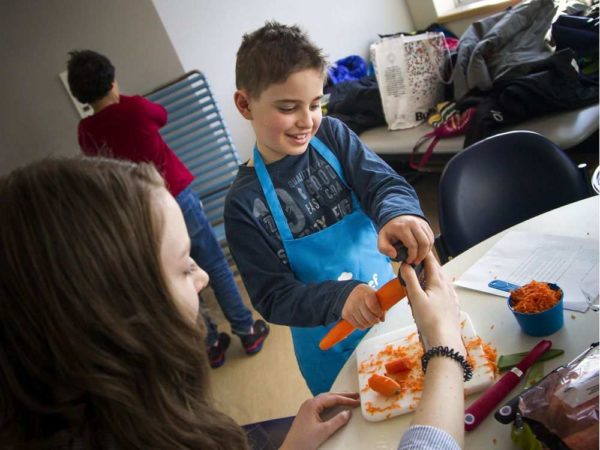
Ten-year-old Quinn Viers meticulously dices a head of cauliflower into chunks.
“I’m helping save the planet by cutting them so small,” he says. “We won’t have to run the food processor so long.”
Across the sun-drenched room in CHEO’s Max Keeping Wing, Dominic Chenier, 9, dries dishes and boasts of his carrot-grating skills.
“I think I’m better with the grater,” he says. “I used to be afraid of cutting myself.”
It’s Sunday morning and CHEO’s Mini-Chefs program is in session. Eight enthusiastic youngsters, all of them on the high-functioning end of the autism spectrum, are hard at work on today’s menu of carrot muffins, cauliflower crust pizza and smoothies. Supervisor Ashley Hilliard, a CHEO recreation therapist, and a team of volunteers, CHEO staff and a student keep a watchful eye over the kitchen chaos, offering assistance and advice and soothing the occasional outburst of anxiety.
This is the second time CHEO has run the Mini-Chef program, which teaches life skills, nutrition and socialization for kids referred from its autism programs.
“The idea is to get these kids to participate in cooking as a leisure activity but also to build some life skills,” Hilliard says. “It helps them realize that in cooking or baking, following a recipe is important for them to be successful. If we start now when they’re young, hopefully they’ll realize that something like following a recipe is a skill that’s going to be important later in life.”
There have been some great successes — Dominic enjoyed the lemon squares best — and some less successful weeks. Like when someone mixed up the sugar and salt in the pancake mix. Or the time someone mistook cumin for cinnamon in the apple crisp: “At least they smelled good,” Hilliard said.
The six-week program runs for four hours every Sunday morning, a stretch of time that can be demanding for kids on the autism spectrum. There are regular breaks throughout the morning and a chair glider where kids can work off some anxiety. For kids overwhelmed by the din in the crowded room, there’s an adult who can take them out for a walk through the hospital’s quiet weekend hallways.
Elisabeth Bellefeuille’s son Julian, 9, took part in the Mini Chef’s program last fall. She says it helped to build his confidence his ability to work with others.
“They learned to work as part of a team,” she said. “It helped him in approaching strangers — like asking for help in a store to find out where something is. It built his self-confidence.”
For parents, Mini-Chefs gives four hours of respite on Sunday morning and let Bellefeuille devote more time to Julian’s younger sibling, who also has special needs. “It’s a bit of a break for us,” she said”
Mini-Chefs is just one of several weekend programs CHEO offers for children streamed toward teaching life skills, social skills, arts and media, and physical activity. Another program concentrated on robotics while in the spring a yoga program will help kids with a need for physical activity.
After chopping the cauliflower, Quinn takes a break in the glider chair and expounds on his encyclopedic knowledge of maps and math.
“Quinn is an Irish name,” he says. “It means wise — but it could also mean consultant.”
Avary, a petite nine-year-old, confesses she sometimes gets tired during the class, but she loves to be around friends, one of whom is a classmate from school.
“It’s a lot of work. Making dough is hard. Sometimes I have to ask for help stirring it. But it’s always worth it. We get to eat what we make,” she said.
“I like it here.”
Twitter: @GetBAC

Nine-year-old Dominic Chenier during a cooking class for a group of children on the on the autism spectrum at CHEO Sunday, March 1, 2020. Ashley Fraser/Postmedia Ashley Fraser / Postmedia
ALSO IN THE NEWS
Snowmobiler dies after going through the ice near Bancroft
Wet’suwet’en chiefs, ministers reach proposed agreement in pipeline dispute
‘It’s like the wild west’: Almonte residents take aim at speeding sledders